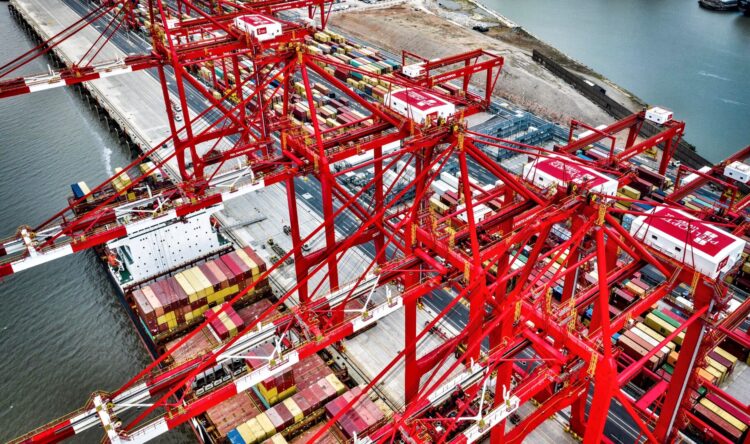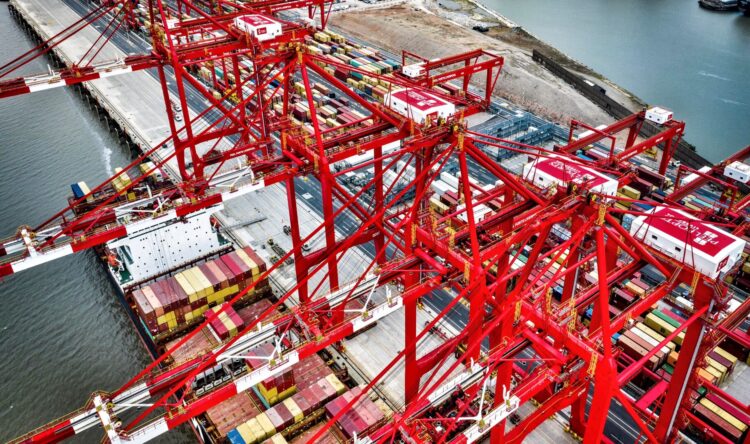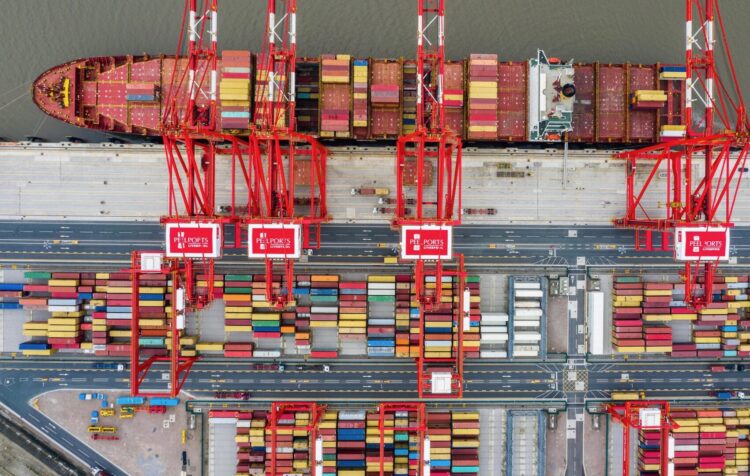Liverpool to secure 20% of UK container traffic by 2025
A fifth of the container traffic arriving at UK ports will be unloaded on the Mersey by 2025, according to Port of Liverpool owner Peel Ports.


This month shipping giants Maersk and MSC reveals they were switching the UK call of its TA2 transatlantic container route from Felixstowe to Liverpool. This follows a decision by the companies switch their TA4 transatlantic route from the southern port to the Mersey in 2018.
Jointly known as the 2m Alliance, their TA2 weekly service connects the North European ports of Bremerhaven, Antwerp, Le Havre and Liverpool to US east coast ports Newark, Baltimore, Norfolk and Savannah.
From December, the service and its huge container vessels will arrive into the Liverpool2 deep water terminal, which is seeing continued investment and expansion to facilitate an increasing number of volumes and services.
Liverpool2 is a £400m terminal capable of handling 95% of the world’s biggest container vessels. It opened in November 2016 and now Peel Ports is investing another £140m to install 10 new cranes at the facility, creating 150 new jobs.
Peel Ports predicts this investment will allow The Port of Liverpool to drive its share of the container market by 15% to 20% by 2025. Last week MSC Tamara unloaded 5,956 containers at the port – setting a new record for Liverpool2.
The Liverpool2 terminal was several years in the planning and Peel Ports could not have known then that in 2016 the UK electorate would vote to leave the European Union. Although the looming Brexit has a number of possible downsides for the UK economy, it could ultimately prove advantageous for the Port of Liverpool. The prospect of new post-Brexit free trade agreements, particularly with the US, offers huge potential for what is the UK’s main western-facing port.
A significant chunk of the UK’s imports comes in through southern English ports and is taken by road to distribution points in the Midlands. This made sense when the Midlands was a manufacturing powerhouse and Britain was a net exporter of goods.
However, today the UK is a net importer but many vessels carrying goods from across the world by sea still unload their containers in the south of England, even though many of the goods are destined for the north of England and Scotland.
Peel has been saying for some time that this makes little sense from both a financial and environmental perspective. Liverpool2 is capable of handling up to two 380m vessels simultaneously and eliminates up to 200 miles of road or rail transport per container journey.
It provides the quickest and cheapest route to major markets and is the best connected container terminal in the country, with ten motorways located within 10 miles.

Liverpool2 is capable of handling up to two 380m vessels simultaneously
David Huck, managing director at Peel Ports Group, said: “We have been working closely with Maersk and MSC (The 2M Alliance) over the last few months to accommodate its TA2 transatlantic service at the Port of Liverpool and expand our transatlantic offering.
“By choosing to re-route the service to Liverpool, the 2M alliance will be able to take advantage of our strategic location, hinterland connectivity and a closer proximity to UK import and export markets, reducing cost, carbon and congestion.”
Mr Huck acknowledges there is still much uncertainty about the consequences of Brexit in the short, medium and long-term. But he insists the port is ready for whatever challenges we face beyond December 31 and is ready to take the lead in driving post-Brexit growth.
“While a Brexit trade deal is yet to be reached, we have ensured we have continued to invest in our people, processes and technologies and last month embarked on a major recruitment drive across Merseyside, ensuring we keep the supply of vital goods flowing across the UK,” he added.
“The team has played a pivotal role in maintaining the country’s steady flow of essential goods, such as food and medicine, and this efficiency and productivity continues in the run up to Christmas and the countdown to Brexit.
“By working with Maersk and MSC on their TA2 service, we hope to encourage more services to the Port of Liverpool, helping alleviate some of the pinch points on supply chains, which have previously relied on Southern ports, and help build supply chain resiliency, which will become more important than ever before as we reach the end of the Brexit transition period.
“Welcoming the world’s leading shipping lines to Liverpool is a testament to the ongoing investment we are making at Liverpool2 and continues to position Liverpool front and centre on the global trading stage.”
Visit peelports.com/liverpool
